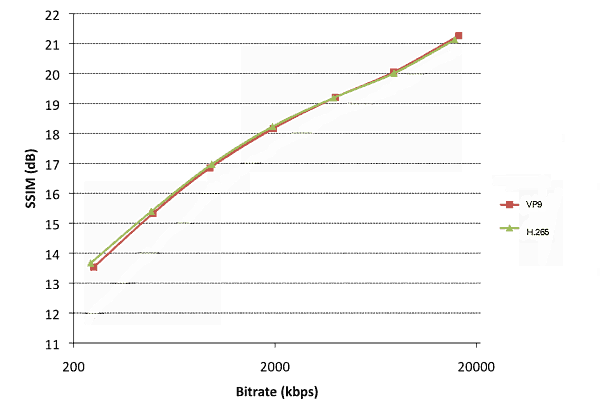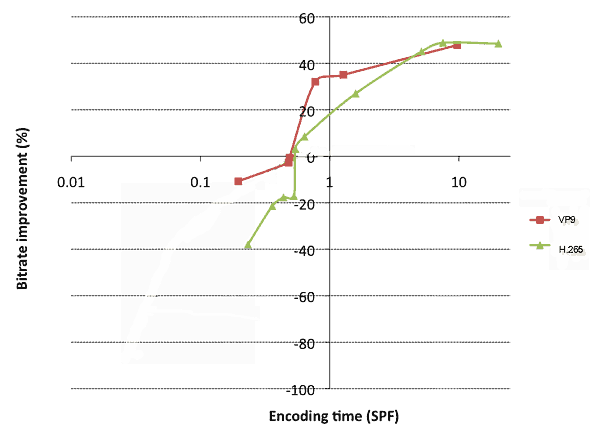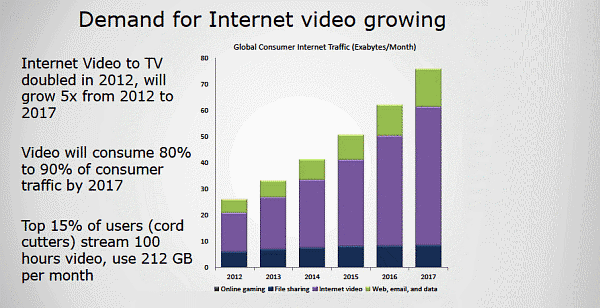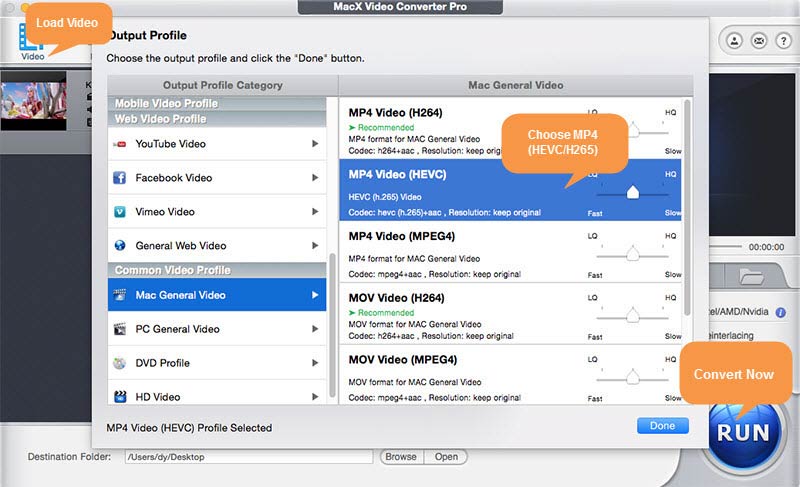
In-Depth Comparison: Unveiling Key Disparities Between VP9 and HEVC for Ultra HD Content Encoding

In-Depth Comparison: Unveiling Key Disparities Between VP9 and HEVC for Ultra HD Content Encoding
![]() Home > Video > HEVC > VP9 vs H.265
Home > Video > HEVC > VP9 vs H.265
VP9 vs HEVC H.265 - Which is the Future of 4K World?
Read the VP9 vs HEVC comparison to get to know more details about VP9 and HEVC codec format quality, efficiency, and compatibility.
![]() By Candice Liu |Last updated on Aug 14, 2023
By Candice Liu |Last updated on Aug 14, 2023
With UHD TVs becoming popular, a better video encoding mechanism is needed to compress 4K content for UHD TVs. That’s why the newer codecs HEVC (H.265) and VP9 vie for attention. Both HEVC and VP9 provide 50% bitrate improvements over x264, and Netflix said that about 20% more efficiency can be observed in HEVC or H.265 over VP9 at 360p, 720p, and 1080p resolutions. Is that true? The VP9 vs HEVC comparison will tell you which will be the winner in terms of quality, efficiency, and compatibility.
Table of Contents
- Part 1. H.265 and VP9 Definition
- Part 2. H.265 vs VP9: Side-by-side Comparision
- Part 3. H.265 and VP9 Transcoder
- Part 4. FAQs about H.265 vs VP9
H.265 and VP9 Definition
What Is H265?
H.265 codec , or High Efficiency Video Coding (HEVC), a royalty-encumbered standard successor to H.264, provides twice the compression efficiency of H.264/AVC. With its huge gains in compression efficiency, HEVC/H265 will offer the same quality at less bandwidth (or half the bit rate/file size) or significantly better visual quality when the internet is bad. The codec is mainly used by Amazon and Netflix to deliver 4K movies and content to Ultra HD smart TVs and OTT boxes.
What Is VP9?
VP9 codec is an open-source codec from Google, and thus is widely used on YouTube, Google Play as well as Google browser, the Firefox and Opera. Like HEVC h265 codec, VP9 also promises twice the coding efficiency of AVC or VP8, and four times that of MPEG-2. One of the biggest advantages of the VP9 codec over H265 HEVC is that it is royalty-free, while H.265 still charges patent royalties to its customers.
What’s the Difference between VP9 and HEVC?
Apparently, both HEVC and VP9 serve the same purpose of compressing data-intensive HD and 4K videos to half the size as required now, so as to survive the limits of internet requirements, and make it possible to stream UHD videos to users’ UHD TVs at less bandwidth without affecting the visual quality. But yes, if bringing up VP9 vs HEVC comparison, there are differences on compression effectiveness, picture quality and other factors.
1. Compression Efficiency
Higher compression efficiency means that less data a codec uses to display an image without quality loss. Both codecs are designed to compress 4K UHD videos to smaller size. But which will save you more data when you download or stream 720p and 1080p content? VP9 or HEVC? There are many experiments conducted between HEVC and VP9, and the results indicate that HEVC provides from 0.6% to 38.2% bitrate savings over VP9 depending on the objective metric which is used. Netflix’s tests also clearly showed that HEVC is 20% more efficient than VP9.

2. Encoding Quality
Video quality is an important factor to consider, which gives the better quality? Massive tests have shown that HEVC H265 offers superior quality to VP9, but how exactly? HEVC can grab 64x64, 32x32, or even 16x16 superblocks for low resolutions, while VP9 is fixed to 64x64. In other words, videos encoded with H265 or HEVC have a better visual quality on low bitrates than VP9. While for higher bitrates, VP9 can be better than HEVC.
Below is a figure that uses SSIM to show you the quality comparison between HEVC and VP9. You can see that the gap between the red and green lines gets larger as the bitrate goes down, and smaller when it goes up. Small differences can be observed: at low bitrates, HEVC slightly outperforms VP9, and vice versa when the bitrates are high.

3. Playback CPU
CPU usage means how much processing power the codec needs to playback. The UHD codecs will requires more power than their predecessors. For example, when you play, stream or download HEVC movies to mobiles , your devices is more likely to gets stuck or overheat than H.264. When it comes to the CPU usage, there are already tests conducted using different resolutions. The results are listed in the table below, from where we can see that VP9 does better than HEVC in CPU usage.
Overall, if your computer runs slow, you may keep using H264, as compared with H264, HEVC won’t give any better results on the same CPU usage. As for VP9, you may expect a slightly better performance. See H265 vs H264 comparison >>

4. Encoding Time
Experiments show that the average encoding time of both VP9 and H.265 is way slower than H.264. But when compare VP9 and H265 encoding time, VP9 will be slower by an average of 7.35. Plus, there is more hardware acceleration support for encoding HEVC h.265 than VP9. For example, Intel adds full encoding and decoding acceleration for H.265 since Skylake, while encoding support for VP9 is only added on Kaby Lake, not to mention the Nvidia HEVC encoder. This gives HEVC a significant edge over VP9. (VP9 hardware-accelerated encoding is now available for FFmpeg if an Intel Kabylake GPU is configured)

5. Compatibility
When it comes to the compatibility difference between VP9 and H265, the story varies based on the platform you play. Apparently, VP9 has better compatibility with web browsers than HEVC, with support on Google Chrome, Opera, and Mozilla Firefox, being the most widely used codec for web based HD video streaming. Plus, there is a huge list of big names like Samsung, LG, Intel, Sony, Sharp, Toshiba, and Philips get support for the codec.
On the side of HEVC, almost all the 4K TVs, VOD media players and major provider of streaming contents adopt it. Plus, Apple also adds HEVC support in the iOS 11 to allow users toplay HEVC on iPhone iPad. Considering the predecessor H.264’s massive adoption, there is a huge possibility that H.265 will be the most commonly used standard for recording devices. Apparently, both codecs will need a VP9 or HEVC video converter for more extensive playback.
6. Bandwidth & File Size
Bandwidth and file size decide the playback experience of the streaming videos. From the figure below we can see that streaming video is becoming an extremely important part of people’s life. Will the streaming video playback be fast and smooth without any noticeable reduction in video quality? As mentioned in the compression efficiency comparison between VP9 and HEVC section, the latter saves more bitrates, namely, smaller file size will be resulted than VP9. Plus, Netflix has proved that HEVC is superior to VP9 with an average 20% bandwidth savings over VP9. That means compared with VP9, HEVC requires less bandwidth and has less buffering when you stream, download orupload HEVC files .

7. Loyalties
Even when Netflix has tested that H265 is 20% more efficient than VP9, it’s still less adopted. One of the main reasons is the licensing fees charged to HEVC users. VP9 is open and royalty free while HEVC is not. With HEVC Advance’s fees targeting 0.5% of content owners, many largest tech companies have to seek for alternatives like AV1 or VP9.
8. VP9 vs H.265: Streaming
VP9 stands out as the robust option for streaming videos on platforms such as YouTube, thanks to its strong compatibility with web browsers. Additionally, its exceptional ability to uphold high-quality video playback while conserving bandwidth positions it as an ideal codec for smooth streaming over low-bandwidth networks.
H.265 offers notably superior performance in efficiently compressing content and facilitating the transmission of high-resolution videos. Its commendable hardware support also enables 4K and HDR streaming, even in scenarios where bandwidth limitations are a significant factor. Ultimately, both codecs exhibit distinct advantages. VP9, with its open-source nature and easy accessibility, appeals to a wider range of users. In contrast, HEVC finds its niche in enterprise-level applications. The decision between the two hinges on your specific utilization needs.
9. VP9 vs H.265: Usage
VP9 is commonly used for web-based video streaming, particularly on platforms like YouTube. Google initially developed VP9 and integrated it into its services. Many web browsers, including Google Chrome and Mozilla Firefox, support VP9, making it a popular choice for online video delivery, especially for websites and services that prioritize web compatibility.
H.265 is widely used across a broader range of applications, including broadcast, digital television, video conferencing, surveillance, and streaming services. It offers efficient compression and high-quality video, making it suitable for a variety of resolutions, including 4K and even 8K. Many hardware devices and software applications support H.265, making it a versatile option for various industries.
Best Encoder and Decoder for HEVC and VP9
While there are many devices supporting both 4K codecs, some other don’t. There is hardware from TVs to mobile devices and set-top boxes that has trouble to play VP9 and HEVC. For example, there are services like Netflix, only support HEVC, and others support VP9 only. If you want to convert both codecs, Handbrake or DivX Video Converter will help. If you want to convert 4K with the fastest speed and no quality loss, then MacX Video Converter Pro is your best bet.
To decode or encode both 4K codecs, first free Download the HEVC and VP9 video converter on Mac or Windows version for PCs:
Download for Mac Download for PC
Free download: Mac Version or Windows Version

Step 1. Click “Add Files” to import the video. Batch convert is supported so that you can import multiple videos.
Step 2. Find the codec or format you need from the column. Here are also ready presets for latest mobile devices.
Step 3. Hit “Browse” button to specify destination folder.
Step 4. Press “RUN” to start to convert videos. If you want to convert the 4K codecs faster, check the hardware encoder box.
FAQs about VP9 vs H.265/HEVC
Is VP9 a HEVC?
No, VP9 is not the same as HEVC (High Efficiency Video Coding), which is also known as H.265. They are two different video codecs developed by different organizations and serve similar purposes of providing high-efficiency video compression. While both VP9 and HEVC aim to achieve efficient video compression, they are separate and distinct codecs with different development histories and implementations.
Is H.265 better quality than VP9?
Both H.265 (HEVC) and VP9 are advanced video codecs designed to provide high-quality video compression. The perceived quality of each codec can vary based on factors such as the content being compressed, the specific encoding settings used, and the capabilities of the decoder hardware or software. Both codecs are capable of delivering impressive video quality.
What is the difference between HEVC and VP9?
HEVC (H.265) and VP9 are distinct video codecs developed for high-efficiency compression. HEVC, a joint effort by ITU-T VCEG and ISO/IEC MPEG, is versatile and widely used in broadcasting, surveillance, and high-resolution streaming, with hardware support on diverse devices. However, its potential licensing fees can impact adoption. In contrast, VP9, created by Google, prioritizes open accessibility and royalty-free usage. It excels in web-based streaming, particularly on platforms like YouTube, benefiting from broad browser compatibility.
Are H.265 files smaller than files encoded with VP9?
No. H.265 (HEVC) and VP9 are both advanced video codecs designed to achieve efficient compression and smaller file sizes while maintaining good video quality. The difference in file sizes might not be significantly noticeable for many users.
ABOUT THE AUTHOR

Candice’s particularly skilled in writing and sharing video-related contents. Her guides cover from deep-seated video/audio parameters, to media entertainment on different platforms. She also enjoys shooting and processing videos by herself for a more reliable basis of informative info with her articles, which are never at the expense of eliminating an entertaining read.
Related Articles

X264 vs X265: Side-by-side Comparison

Convert Videos to HEVC H.265 Codec Format

Handbrake Tutorial: How to Decode X265 to X264 Fast

How to Convert MP4 to HEVC H.265 Codec Format

Simple Solution to Convert MKV to HEVC for Faster Uploading

Fastest 4K HEVC to MP4 Converter for Mac and PC
![]()
Digiarty Software, Inc. (MacXDVD) is a leader in delivering stable multimedia software applications for worldwide users since its establishment in 2006.
Hot Products
Tips and Tricks
Company
Home | About | Privacy Policy | Terms and Conditions | License Agreement | Resource | News | Contact Us
Copyright © 2024 Digiarty Software, Inc (MacXDVD). All rights reserved
Apple, the Apple logo, Mac, iPhone, iPad, iPod and iTunes are trademarks of Apple Inc, registered in the U.S. and other countries.
Digiarty Software is not developed by or affiliated with Apple Inc.
Also read:
- 2024 Approved Innovative Approaches to Capturing Skype Calls on OBS
- 無限制網路免費GIF轉變成SWF - 利用Movavi GIF到SWF自動轉換工具
- 直接上網無成本轉動3GP到AVI影片:Movavi自由化映像轉移工具
- Breaking Down Android Version 16: New Features, Launch Dates, Price Guesswork & Exciting Specs
- Convertidor Online Sem Custo Para MP3, WAV, FLAC Em MP4 Com O Movavi
- Developing Loyalty Programs to Reward Repeat Customers and Incentivize Further Purchases.
- Easy Steps to Updating Drivers: A Guide for Intel Centrino Ultimate-N 6305 Wireless Network Card Users
- Get the Latest Graphics Card Drivers for Your HP 840 G3 – Easy Download and Installation Tips
- Gratuito E Fácil: Maiores Programas Para Alterar Tamanho Do Vídeo Em Qualquer Lugar!
- In 2024, Comprehensively Conquering HP Notebook Screen Recording Techniques
- In 2024, Step-by-Step Audio Augmentation for Quality Video Files on QuickTime
- M4R프레임 속성을 사용한 원근 개방: 이웃 구역에서 무료 MP3 변환기 – Movavi
- Online Konvertoren: 3GPP Naar MP4 Zonder Kostprijzen Met Movavi's Hulpbronnen
- Scambio Libero: Trasformare Il Video WebM Nel Formato MP4 Utilizzando Il Servizio Gratuito Di ConvertiVideo Online
- Still Using Pattern Locks with Realme C51? Tips, Tricks and Helpful Advice
- Title: In-Depth Comparison: Unveiling Key Disparities Between VP9 and HEVC for Ultra HD Content Encoding
- Author: Jeffrey
- Created at : 2024-11-30 19:09:39
- Updated at : 2024-12-07 17:52:57
- Link: https://eaxpv-info.techidaily.com/in-depth-comparison-unveiling-key-disparities-between-vp9-and-hevc-for-ultra-hd-content-encoding/
- License: This work is licensed under CC BY-NC-SA 4.0.




